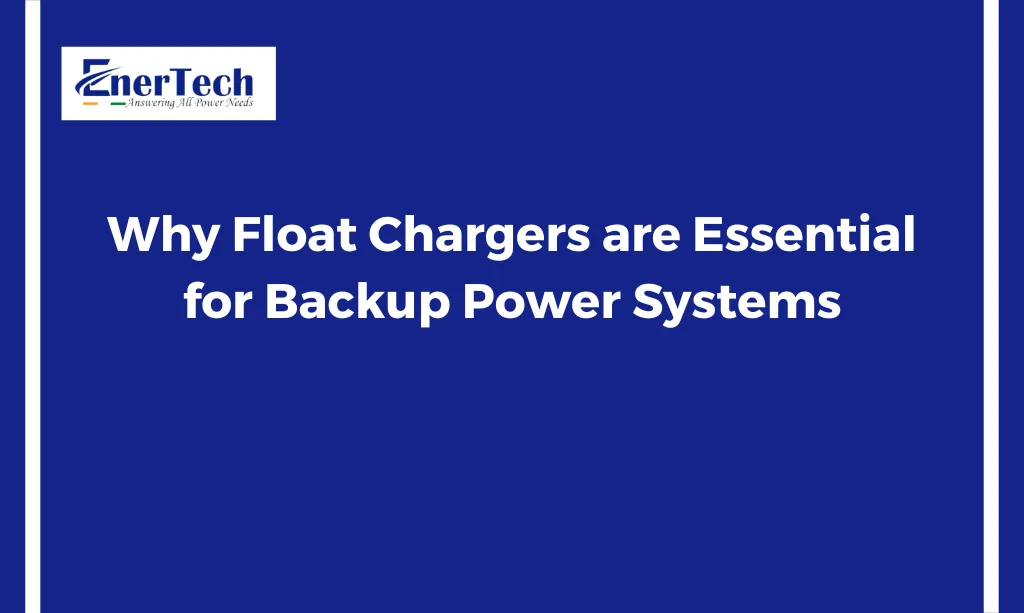Today, the world has become excessively power-dependent. Therefore, it counts on an uninterrupted power supply for everything from businesses to routine lives. Even seconds of interruption can cause colossal damage!
Now, no matter what, you cannot fully control an outage. This is where backup power systems come into play. But then again, they are just as good as their charge. And that’s precisely where floating chargers step in.
You can call them the silent protector of power continuity, particularly given their critical contribution to backup power systems. Here’s how.
These are devices that keep backup batteries fully charged, while not overcharging them. Standard chargers continuously push current into the battery. But float chargers auto-adjust to maintain an optimal charge level once the battery reaches full capacity. Thus, they help keep the battery healthy and ready for use without degrading or damaging it.
Now, let’s understand the role of float chargers in backup power systems.
8 Factors that Make Float Chargers a Vital Component of Backup Power Systems
From peak preparedness to its suitability for long-term power backup applications, these six factors show how crucial float chargers are to backup power systems.
Ensuring Optimal Readiness
Backup power systems must deliver instant energy the moment the main power fails. However, batteries are the soul of backup power systems. Therefore, the preparedness of batteries can render a backup power system useful or useless.
This is where float chargers step in. They maintain the battery’s charge at 100% capacity, thus ensuring the system responds immediately as the situation demands. So, no delays and no weak starts!
Preventing Overcharging
Standard or conventional chargers can overcharge batteries if you don’t disconnect them once the charging is over. Overcharging can lead to overheating, loss of electrolytes, or even irreparable damage to the battery.
However, float chargers use intelligent voltage regulation that prevents overcharging. Thus, they help extend the battery lifespan and ensure consistent performance.
Self-Discharge Compensation
Batteries can slowly lose charge due to internal chemical reactions when they are not connected to a load. Since backup systems can remain idle for longer durations, their batteries, if not connected to a float charger, may be dead when you need them.
A float charger proves to be a critical device in a situation like this. They provide a minimal amount of maintenance current to accurately replace the lost energy and ensure the battery stays topped off!
Preventing Thermal Runaway
When overcharged, batteries generate heat and lose internal resistance. This causes them to accept even more current, generating more heat, and compelling them into a vicious cycle called the thermal runaway.
Thankfully, you have float chargers to prevent such thermal runaways. They use a low, constant-voltage approach, usually with temperature compensation, to exercise a stringent control over the current. Such an active regulation helps prevent overheating and subsequent disastrous failures!
Improving System Reliability
Float chargers, whether in a UPS, generator setup, or emergency lighting system, ensure backup power is perpetually ready to engage. In other words, they help improve the system’s reliability, leading to fewer unforeseen failures.
Enhancing Voltage Regulation
Usually, backup systems have the battery, charger, and load connected in parallel. When the main power is active, the float charger, while charging the battery, also serves as a DC power supply for the connected load. Therefore, it provides a clean, stable DC voltage to the equipment while at the same time, trickle-charging the battery, ensuring the load is supplied with consistent and uninterrupted power.
Low-Maintenance Operation
A complex charging routine is impractical for systems designed to auto-operate for years. Float charging works as a set-and-forget solution. Once you set the correct float voltage for the battery type, the charger auto-manages the maintenance part, minimizing monitoring and also the need for constant manual upkeep.
Serving Long-Term Power Backup Applications
Float chargers are indispensable in facilities such as emergency systems or remote installations where backup systems may remain inactive for months. They ensure batteries stay charged and operational even after prolonged periods of inactivity.
Switch to Float Chargers for More Reliable Power Backup Systems
Float chargers are compact devices with a significant impact on system reliability, safety, and cost-efficiency. They strengthen your backup system by helping you maintain optimal charge levels, preventing overheating, and extending battery life. Of course, they involve a considerable upfront investment. But it is a value-driven investment that pays off in the long run.
Now, if you want to install float chargers for your power backup systems, you must obviously make a reliable choice. Enter EnerTech’s industrial Float Cum Boost Charger (FCBC). As the name suggests, our FCBC charger operates in the float and boost mode and is equipped with an array of features that include;
- Efficient overload cut-off system
- Built-in surge and noise reduction system for communication chargers
- Short circuit and overcharge protection
- Microcontroller-based design
- Communication protocols like SNMP/RS-232/MODBUS
- IGBT rectifier for input power factor greater than 0.9
- Voltage ranges of 24V/48V/110V/220V with a current rating of up to 800 Amps
So, would you like to explore more about our FCBC charger and make the smart switch? Please email us at sales@enertechups.com.




